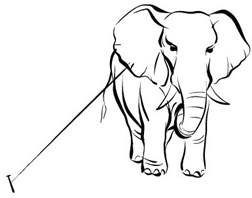When a situation does not depend on us and an immediate solution is not in our hands, we humans tend to get nervous and look for a way out. We need answers to a million questions, because everything is new, everything is confusing ... It is very difficult for us to manage uncertainty.
As the days go by, we get used to it, we accept the uncertainty as best we can and thus we incorporate it into our lifestyle. We accept that we have what we have and that we cannot do much more and finally, we yield to it because, above all: we humans have our habits.
Nevertheless, this adaptation may not always be beneficial, learned helplessness is one of the most undesirable consequences in cases where we cannot change our position into a better one. Talking for example, from an economic crisis or the simple fact of not being able to do and activity that made us feel good anymore.
LEARNED HELPLESSNES is a concept formalized in 1967 by the American psychologist Martin Seligman and is the condition in which a human or animal has "learned" not to do anything, and to feel incapable of escaping or changing a situation to which it has been submitted, after several frustrated attempts to escape or avoid that pain.1
This concept is very well explained in Jorge Bucay's famous story “The elephant tied to a stake”, in which we see an elephant who grew up in a circus and was tied from a young age to a stake much bigger than him through a chain; day after day the elephant tried to free himself from it with all his might, but finally, as time passed by, he stopped doing it, because all his attempts were futile. When he became into an adult elephant and therefore, much bigger than that stake, he never tried to escape again, because he had already assumed it was an irreversible situation.

This is it, in front of adverse situations that are beyond our control, we let come everything that has to come, because it does not depend on us.
Abandoning ourselves in these situations can be somewhat tempting, even when conditions have changed without us realizing about it, but it is also important that we are open to discover the existence of alternative ways that we may have not considered.
Although on the other hand, we all know someone who has managed to overcome their circumstances, recovering from a mourning (the loss of a job, the loss of a loved one, a breakup ...), reinventing and strengthening themselves along the way.
This skill of coping and overcoming adverse situations is known as resilience.
RESILIENCE is how to adapt positively to unfavorable situations. (In short, it kind of the Kelly Clarkson's famous “what doesn't kill you makes you stronger”)
Psychology tells us about learned helplessness and resilience (just plain), as if this last one was an innate gift.
And the truth is, just like everything, it requires practice and perspective, but resilience can also be learned.
We find ourselves in a moment where we need to be realistic and to recognize our limitations; the world has stopped and that, has made us think, we have no other choice. We must wait, since it does not depend entirely on us that the situation reverts and returns to normal (although for the moment, I do invite you to rethink the term "normality").
But we cannot wait and "learn" to be helpless, as a consequence of accepting a situation. Maybe we are locked up at home, but today nothing prevents us from staying connected to reality, knowledge and other people. We’re already familiar with technologies, we’ve been doing it for years. Those resources exist and we have it there.
New scenarios are opening, an environment to which we must adapt and we must try to see beyond the chain that binds us to the stake.
And new opportunities will arise, new needs will be born. Because, although much of the production has stopped, people are still active; creativity of our minds is unleashed since physical displacement and all the external stimulus that stuns us on our “normal” routines day to day have been reduced.
And even though we’ve been told and shown that this situation is beyond our control, let’s remember that apart from learn on how to feel vulnerable, we can also learn on how to recover.
1 Domjan, M. (2010). Principios de aprendizaje y conducta: Michael Domjan (6a. ed.--.). México D.F.: Cengage Learning.

Marisa Perez




